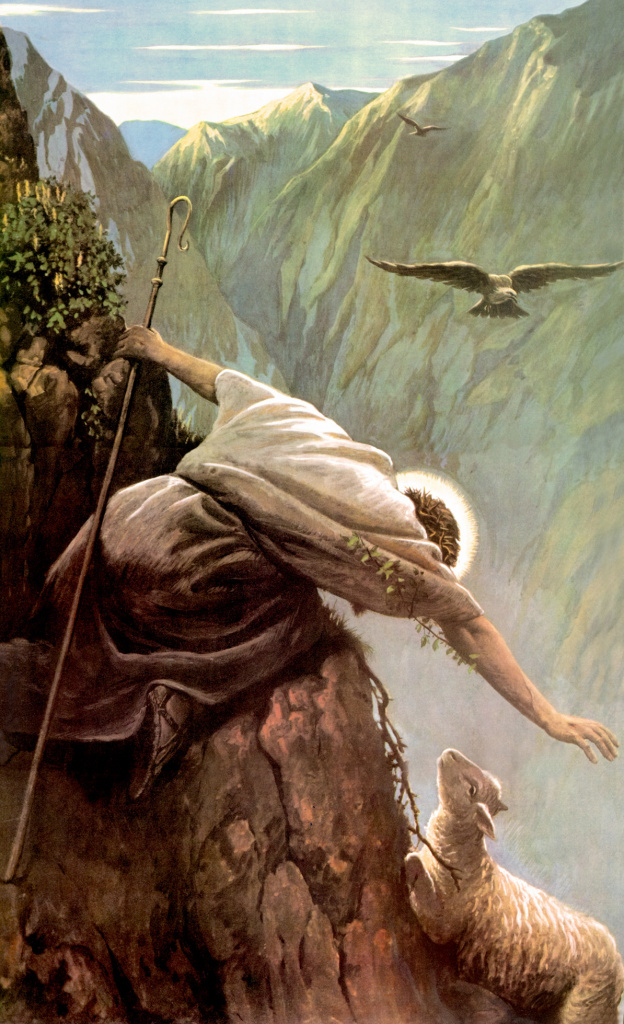• In this chapter, we will look at what God’s values are, and what kind of leader He is.
1. Introduction 2. The World Is A Battlefield 3. The Church: A Feast for Oppressors? 4. How Did We Become Victims? 5. How do victims communicate? 6. Being a victim of an offense and victimhood 7. Learned Helplessness 8. Victim-blaming 9. God’s solution to sin 10. How Satan uses the Bible to force us to submit to him 11. The Good Shepherd 12. Victimhood as a weapon 13. The Victorious Christian 14. Practical exercise towards freedom. 15. Restore your trust in God. 16. Why God allows difficulties. 17. Church Tribulations 18. Final Victory 19. Afterword
In the book of Ezekiel, we learn about how God wants to care for His church. It is a setting where chaos in His congregation has taken over. The leaders no longer reflect God’s love for mankind. «Son of man, prophesy against the shepherds of Israel, prophesy, and say unto them, Thus saith the Lord GOD unto the shepherds; Woe be to the shepherds of Israel that do feed themselves! should not the shepherds feed the flocks?»
A church and its leadership should be like a hospital for those afflicted by sin. God’s accusation against the unfaithful shepherds is: «The diseased have ye not strengthened, neither have ye healed that which was sick, neither have ye bound up that which was broken, neither have ye brought again that which was driven away, neither have ye sought that which was lost; but with force and with cruelty have ye ruled them.»
He blames them for only caring about their needs. He says they live off their congregation, they «clothe you with the wool».
Because they did not protect their members, God says: «And they were scattered, because there is no shepherd: and they became meat to all the beasts of the field, when they were scattered.» The scattering of Christians is painfully true in our day of age. People are running from church to church, from teacher to teacher, from leader to leader, seeking God’s word. Everyone is in disagreement with everyone. And while scattered, the devil has had the opportunity to destroy them. They became «meat to all the beasts».
He also accuses them of not «searching for» the afflicted. Not caring what happens to those who live distressed. They aren’t concerned about people’s fate. They don’t seek them or ask for them.
«Therefore, O ye shepherds, hear the word of the LORD; Thus saith the Lord GOD; Behold, I am against the shepherds; and I will require my flock at their hand, and cause them to cease from feeding the flock
…For thus saith the Lord GOD; Behold, I, even I, will both search my sheep, and seek them out. As a shepherd seeketh out his flock in the day that he is among his sheep that are scattered; so will I seek out my sheep
…I will seek that which was lost, and bring again that which was driven away, and will bind up that which was broken, and will strengthen that which was sick: but I will destroy the fat and the strong; I will feed them with judgment» (Ezekiel 34:1-16)
Nowhere do we see God accusing His sheep because they were «driven away», for being «broken» or for being «sick». Rather, he says He wants to heal them and care for them.
God is the perfect shepherd and is illustrated as such in both the Old and The New Testaments. Christ told another parable similar to the parable we see in the book of Ezekiel.
«For the Son of man is come to save that which was lost.
How think ye? if a man have an hundred sheep, and one of them be gone astray, doth he not leave the ninety and nine, and goeth into the mountains, and seeketh that which is gone astray?
And if so be that he find it, verily I say unto you, he rejoiceth more of that sheep, than of the ninety and nine which went not astray.
Even so it is not the will of your Father which is in heaven, that one of these little ones should perish» (Matt.18:11-14)
In the world, our value is tied to our accomplishments and success. With God, our value is that we are His creation, His children that He loves. He understands pain and wounds, and He does not blame us for being hurt, but He wants us to find peace and healing.
The Bible does not teach us to despise weakness but to care for the weak.«And through thy knowledge shall the weak brother perish, for whom Christ died? But when ye sin so against the brethren, and wound their weak conscience, ye sin against Christ» (1Co 8:11-12)
The heathen world teaches survival of the fittest in every aspect of life. The Bible values the weak and the unsuccessful equally, and asks us to do the same.“Defend the weak and the fatherless; uphold the cause of the poor and oppressed.” (Psalm 82:3)
It is our carnal hearts that “victim-blame” and despise and fear weakness in others. It is the carnal heart that seeks the popular and the celebrated. Furthermore, it is the carnal heart that seeks to elevate our own worth by mingling with the admired. When our hearts are filled with the Spirit, we will see men as equally worthy. Our time and care are not given just to those whom we wish to gain something from. (Luke 14:12) Uplifting the broken, opening our home to the forgotten. Sharing our success with those less fortunate. This is Christianity. Every “sheep counts”.
In Christianity, it should not be survival of the fittest, but rather the strong helping the weak on the way forward and the weak blessing the strong. Everyone has something to contribute, even the despised and rejected. It is our mission as Christians to seek the potential in all, the worth in all. There is no person we can not learn something from. No interaction we cannot grow from. Usually, it is the interaction with those most different from us, in a different circumstance, or who have had a different experience that we grow the most from meeting and speaking to. Those who only reflect us, and our lives give us less personal growth. To grow we need to constantly add information and knowledge not just preserve what we have. Approaching people who are outside our comfort zone can even help us become more confident.
When we see each person’s worth despite their circumstances and struggles, we help Christ in His work. Every individual has value, regardless of what they have been through. If we don’t wish to care for the damaged among us, we resemble the unfaithful shepherds, the unfaithful goats, and the unfaithful servants in all of Christ’s stories.




